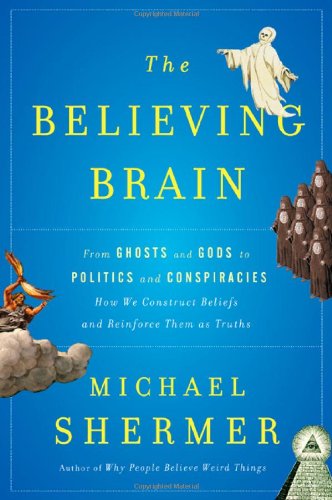
The Believing Brain
From Ghosts and Gods to Politics and Conspiracies---How We Construct Beliefs and Reinforce Them as Truths
فرمت کتاب
ebook
تاریخ انتشار
2011
نویسنده
Michael Shermerناشر
Henry Holt and Co.شابک
9781429972611
کتاب های مرتبط
- اطلاعات
- نقد و بررسی
- دیدگاه کاربران
نقد و بررسی

Starred review from March 14, 2011
As the founding publisher of Skeptic magazine, author of Why People Believe Weird Things, and a columnist for Scientific American, Shermer is perhaps the country's best-known skeptic. His position is as clear as it is simple: "When I call myself a skeptic I simply mean that I take a scientific approach to the evaluation of claims." But now Shermer is interested not only in why people have irrational beliefs, but "why people believe at all." Our brains, he says, have evolved to find meaningful patterns around us. But why do people believe they see patternsâwhether "evidence" of angels, conspiracy theories, or UFOsâwhere none exist? Drawing on evolution, cognitive science, and neuroscience, Shermer considers not only supernatural beliefs but political and economic ones as well. He demonstrates how our brains selectively assess data in an attempt to confirm the conclusions we've already reached. Informative and difficult to put down, this book adds a compelling and comprehensive case to the growing number of arguments about the importance of scientific reasoning, marred only by Shermer's repeated citing of his own works and public appearances. B&w illus.

February 1, 2011
Skeptic magazine founding publisher Shermer (The Mind of the Market: Compassionate Apes, Competitive Humans, and Other Tales from Evolutionary Economics, 2007, etc.) writes entertainingly about the scientific basis of belief.
The author cites a 2009 poll in which more Americans admitted to a belief in angels and devils than in the theory of evolution. Shermer seeks to answer the question of why "so many people believe in what most scientists would consider to be the unbelievable?" While admitting that scientists often believe in unproven hypotheses—e.g., the origin of our universe and what might have preceded the Big Bang—the author holds firmly to the "built-in self-correcting machinery" that is inherent in the scientific method: e.g., double-bind controlled experiments which are replicable, testing results against the null hypothesis, etc. Shermer takes gleeful potshots at conspiracy theorists, including the 9/11-truthers, giving a detailed refutation of their claim that planted explosives brought down the Twin Towers, and the belief in extrasensory perception demonstrated by the apparent abilities of psychics and other mediums, which have been replicated by magicians. Nonetheless, the author fully recognizes the importance of belief in our lives. Jumping to false conclusions is an outgrowth of pattern recognition, an essential function of our brain that evolved to allow birds as well as mammals to anticipate danger and respond to their environment. "An emotional leap of faith beyond reason is often required," writes the author.
A timely, reasoned reflection on the nature of belief, offering a level-headed corrective to the divisiveness of extreme partisanship.
(COPYRIGHT (2011) KIRKUS REVIEWS/NIELSEN BUSINESS MEDIA, INC. ALL RIGHTS RESERVED.)

June 1, 2011
Crusading against credulity, Shermer challenges popular beliefs in his books, television appearances, and Scientific American column. This encapsulation of his skeptical posture opens with a personal account of his development from Evangelical Christian to doubter of God's existence. The book's bulk then covers the insights into belief offered by experimental psychology, neuroscience, and evolutionary theory. To condense Shermer's thesis, people form a belief first and find evidence for it second. Beliefs form, according to his interpretation of the research he describes, because of the brain's propensity to make patterns out of the sensory influx and assign agency to them. Covering convictions about religion, UFOs, conspiracies, and politics, Shermer elaborates on ways the believer buttresses belief via such mental habits as confirmation bias, which seizes on supporting facts and arguments and ignores conflicting evidence. If he succeeds in making readers feel beset by illusions, he commends to them the scientific method, illustrated by historical episodes from astronomy, for placing a foundation of proof beneath their beliefs.(Reprinted with permission of Booklist, copyright 2011, American Library Association.)

























دیدگاه کاربران